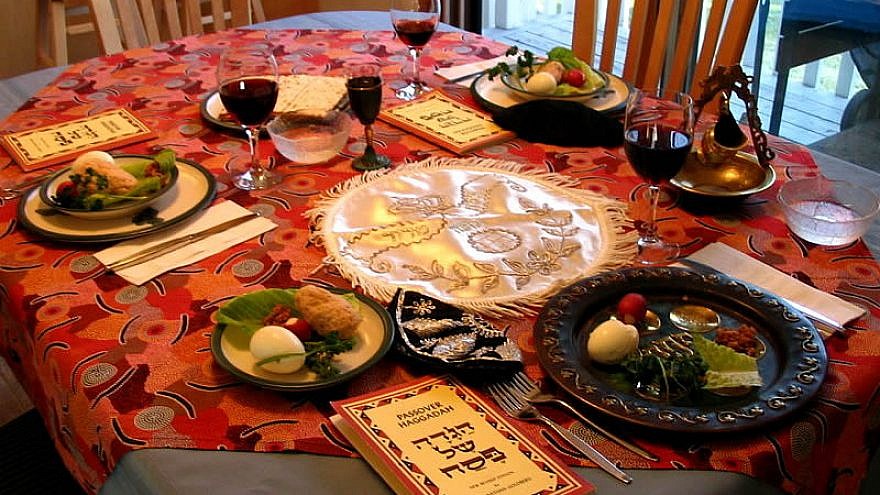This Saturday night in the midst of the loosening COVID-19 pandemic and the tightening of America’s cancel culture pandemic, Jewish families will celebrate the Passover seder.
Veterans of seders past anticipate the drinking four cups of wine, ingesting mass quantities of matzah and gasping for air as they ingest horseradish.
This year, all generations sitting around the table would be well-advised to take a deeper dive into the Haggadah—the narrative retelling the epic Exodus of the Hebrew slaves from ancient Egypt. It turns out that the Haggadah has plenty to say about a woke/cancel culture.
There is nothing woke about the seder. In fact, here are some points to keep in mind.
- Jews are all about memory.
- Far from erasing the past, the Haggadah insists we re-enact it.
- The past, warts and all, is key to understanding who we are. Before the Haggadah recounts the Ten Plagues, the harried exodus of G-d’s chosen people and the splitting of the sea, it starts with a discomfiting truth: Our people’s lineage traces back to very humbling beginnings. Our founding father, Abraham, started his journey to greatness in a family of idol worshippers. Our forefather Jacob spent more than two decades, little more than an indentured servant under the thumb of the conniving, Laban.
- The struggle to define and maintain one’s identity is not new. The Hebrews came to Egypt as 12 fledgling families. They left a nation. How did that happen? While the progeny of the 12 sons of Jacob successfully assimilated into Egyptian society, they retained their identity. Despite the power of the dominant culture, despite escalating discrimination culminating in abject slavery, the Hebrews kept their language, their original names and their distinct garb.
- Symbols of slavery can be transformed into symbols of freedom. Matzah is called “poor man’s bread.” We are told that slaves would break off a piece and keep it hidden, never sure that the next meal was coming. Yet matzah quickly emerged as a symbol of victory over slavery. And so, a powerful symbol of suffering and hopelessness can remind us and teach our children about hope, perseverance and triumph.
- Don’t hide past tragedies. At a pivotal moment of the seder, we eat the bitter herbs to momentarily taste the bitterness of slavery. But we are told to dip it into a sweet concoction called charoset. Takeaway: What doesn’t break you can make you stronger. We were slaves, look how far we have come.
- Let your past tragedies guide your actions. Throughout the biblical narrative, Jews are admonished scores of times. You were once a slave, you were once the stranger in a strange land, you were once the odd man out in an alien culture: Remember how that felt and remember to treat every stranger you meet with dignity and respect.
- We are not commanded to hate (read cancel) the Egyptian people. Our sages remind us that before they enslaved the Hebrews, Egypt had welcomed them and initially allowed them to thrive. It’s a powerful, nuanced lesson—one that would be lost on any culture too committed to erase the past rather than be able to learn from it.
- Community is the foundation of identity. During the times of the ancient Holy Temples, Jews were commanded to come to Jerusalem and bring a sacrifice to celebrate Passover. The meat from the lamb was eaten with matzah and bitter herbs. Triumph and tragedy remembered in one bite. But there was one caveat: You could not eat the Pascal lamb alone. On this night, you had to celebrate with a group of friends or family of your choosing. Called a chabura, the word comes from the root means “binding.”
- “Actions of our fathers instruct their children.” This dictum has been embedded in the DNA of the children of Abraham and Sarah for 3,500 years. It is the foundation of our peoplehood, key to our survival in long and bitter exiles, and central to the amazing blossoming of the old/new startup nation called Israel.
- As the Hebrew slaves rushed to leave Egypt, Moses rushed back to retrieve the bones of Joseph. By doing so, Moses created a teaching moment for the ages. None of us can predict the future, but we will all be better equipped to deal with the unknown by carrying the legacy of our past with us.
These teachings first spoke to us Jews, but they can also guide our beloved America and other democratic societies that seem to have lost their grounding and traction. The Jewish experience has taught that without a past, there is no future. Shared values and a sense of community are the only guarantors for a future anchored in freedom.
So, on this Passover, let’s counsel before we cancel.
Rabbi Marvin Hier is the dean and founder of the Simon Wiesenthal Center, its Museum of Tolerance and of Moriah, the Center’s film division. Rabbi Abraham Cooper is associate dean and director of Global Social Action at the Simon Wiesenthal Center.


























